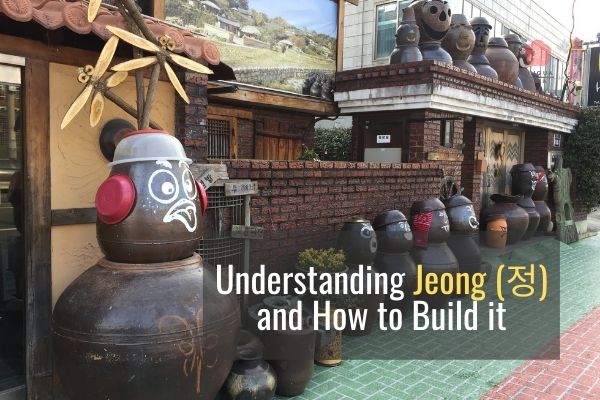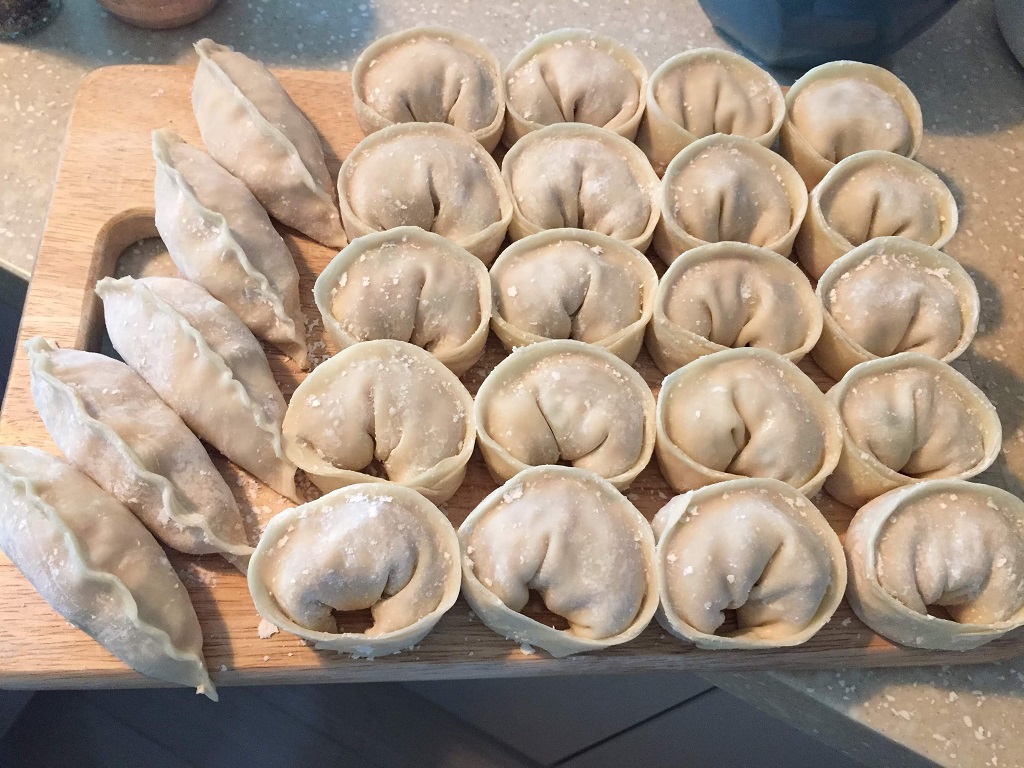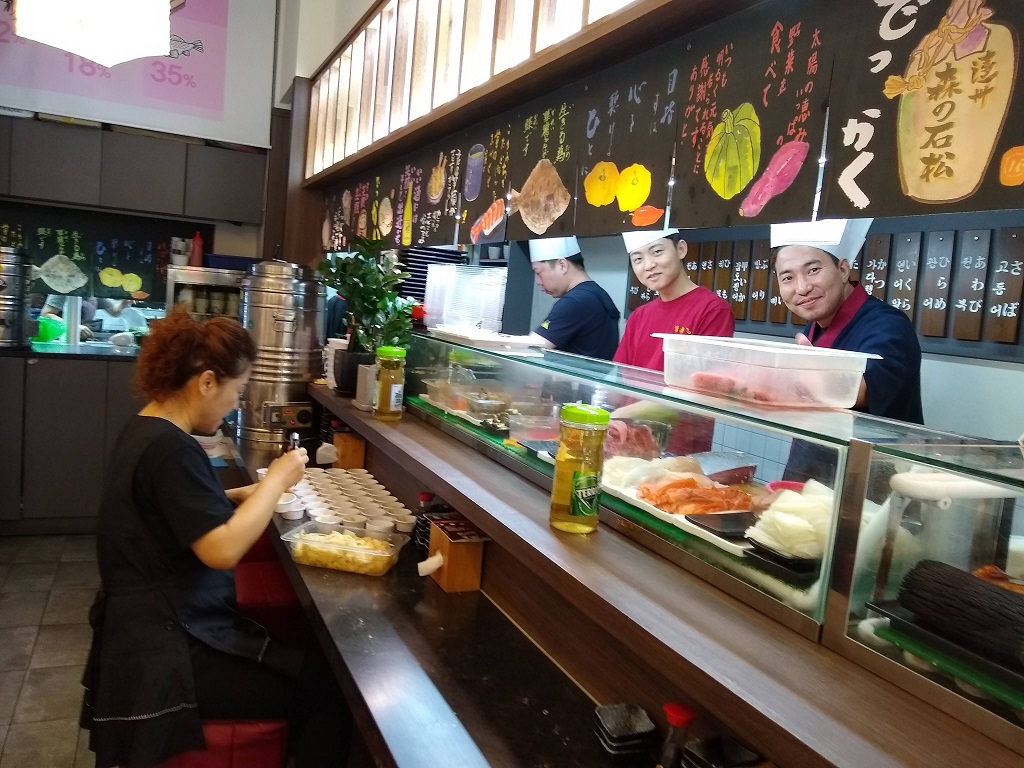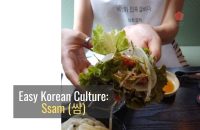Jeong is that warm and fuzzy feeling you get when you bond with a person, place or thing. It doesn’t require effort and often just happens.
This post helps you:
- understand what jeong means
- know when it comes in handy
- find out how to build jeong
- learn some useful phrases
Jeong is one of my favorite parts of Korean culture.

Quick Summary
- Jeong refers to an unspoken bond or camaraderie.
- Jeong is a positive emotion that can be between anyone and even objects and places.
What does jeong mean?
Jeong (정) is what I like to call an “unspoken bond” or camaraderie. It’s partially related to the collective feeling of social responsibility you’ll find in Korea. Like parents taking care of children and older brothers/sisters taking care of their dongsaeng.
It’s a positive emotion that can be between anyone and even objects and places. It’s also generous, irrational and without strings attached. It’s somewhat vague, so here are some common examples to clarify things:
Jeong takes time but often forms naturally.
- a lady at a convenient store in your neighborhood straightening your tie in the morning
- an elderly person giving you a tangerine or holding your bag when you give up your seat on the bus or subway
- a restaurant owner giving you free food or drinks when you’re a regular customer
- a young man helping an older lady cross the street
- offering a bite of your meal to a friend who ordered something different
- a new neighbor bringing you tteok (rice cake)
Jeong is such an integral part of Korean culture that there’s a ton of phrases related to it.
Examples of jeong used in phrases:
- 다정하다 (da-jeong-ha-da): Literally means “lots of jeong”, but actually means “affectionate” or “warm-hearted”.
- 정이 들다 (jeong-yi deul-da): Means “become fond of” or “become attached to” someone.
- 정 떨어지다 (jeong ddeol-uh-ji-dah): Literally means “dropping jeong”, but actually means someone “turning you off” or you become “out of patience with” someone. Often happens when someone does something rude or gross.
- 미운 정 (mi-woon jeong): Means “affection from hatred”. Usually, a wife who doesn’t like her husband says, “I live with him for 미운 정”. (We’re only together because of jeong.)
- 고운 정 (go-woon jeong): Means “affection from love”. Typically used together with 미운 정, like 미운 정 고운 정 다 들었다 as in, I’ve been through thick and thin with someone.
- 정 없다 (jeong eob-da): Literally means “no jeong”. If someone is too cold or stingy, Koreans will say that they’re 정 없다.

Essential facts about jeong

Korea has a high-context culture, meaning many things are communicated non-verbally, including affection.
Despite what you hear in K-pop songs, people don’t go around saying they love everyone. That’s reserved for young couples and is rarely used, especially between family members.
Family members, especially married couples who’ve been together for decades, tend to have jeong instead, which they show by their actions.
Koreans consider themselves one big family. That’s part of the reason they say 우리 (our) instead of my mom. It’s the perfect environment for jeong.
Koreans have shared experiences such as men serving in the military and women having to cook during holidays. There’s a deeper understanding they can gain just by looking at someone.
Understanding jeong can help you a lot in a professional environment.
Jeong builds the quickest among family members and takes the longest to form among strangers. But, it still can happen in an instant.
Jeong tends to happen organically throughout the natural course of the day.
Jeong is something you can build in any country. It just so happens that Koreans have a name for this concept.
How jeong can improve your life
It can help you form life-long bonds.
It’s a very energy efficient way to convey affection.
It can create opportunities professionally and socially.
It can help you appreciate the finer things in life.
It will improve your well-being.
Cons of jeong
Like all good things in life, a few bad apples might exploit this concept.
For example, an older person gives you some snacks and then proceeds to complain about their husband or patronize you.
Bosses buying meals then forcing you to work overtime for free.
If you feel uncomfortable with how things are developing in a relationship, you can always pull back.
Jeong is altruistic at an appropriate level, but it can turn into 오지랖 (ojirap or nosiness) when it’s too much.
In the old days, people used jeong as slang for bribes.
How to build jeong with others

- Keep an open mind when you meet others.
- Say less and feel more.
- Reciprocate but don’t feel pressured.
- Share food together with honest and constructive conversation.
- Be kind to others when possible, even those who can’t help you.
What jeong is like in Korea
Despite the fact that I grew up with Korean American friends, I didn’t learn about jeong until I went to Korea.
People in Seoul were very standoffish at first. I get it now. It’s a mega-city of 10 million people and there’s only so much energy one can spend on strangers.
The first time I tried to speak Korean to the ajumma running the convenience store in my neighborhood, I was met with suspicion and blown off. After going to the same convenience store for a few weeks, she warmed up to me. The lady would give me tangerines and straighten my tie before work. She would fuss over how my jacket wasn’t warm enough in winter. I never learned her name but she regarded me as a part of her extended family.
My first apartment was semi-basement-level (just like the movie Parasite) in a seedy part of town. One of my adult students offered a place to stay for free while his wife was studying in the UK. I lived there for 8 months without paying a dime. When his wife moved back, he made sure to find me another place to live in exchange for teaching private English lessons to the owner’s children. I lived in Mapo in a brand new officetel for 8 years and eventually was paying a small fraction of the rent they could get with a new tenant.
While living in Mapo, I went to a doctor whose two sons were going to medical school in the states. He saw me as one of his children and never charged me for checkups over the course of 7 years. He even looked after my friends who were traveling in Korea. I still visit him with gifts whenever I’m in the area.

My favorite sushi restaurant and café in the world just happen to be in Mapo. The owners at both places have given me so much free food and coffee that I’m not entirely sure they’ve made a profit.
I was very uncomfortable with this at first. I tried many times to pay and eventually gave up. The key to jeong is giving back to the younger generations.
Jeong is something that I take for granted when I’m having a tough time in Korea. There are people in the country who remember my name and make me feel at home even after years of not seeing them.
Korean has some great idioms and concepts that make it worth learning. They are:
- noonchi – intuition or sense
- jeong – unspoken bond
- gibun – mood or feeling
- sohwakhaeng – small but certain happiness
- subeesu – free stuff
- banchan – side dishes
- ssam – leafy vegetable wrap
Knowing these will be bring you one step closer to understanding Korean culture!
Subscribe for
exclusive info on Korea
Did we miss anything?
Let us know your thoughts on jeong in the comments!






Love your work! keep going
Hi Mel, thanks for the kind words!
I learned a lot reading this!
Hi Jasmine, I’m glad it was a helpful article!
Jeong is a warm and fundamental part of Korean culture.